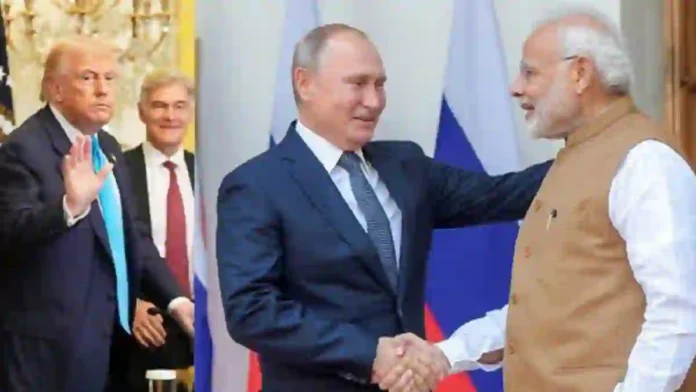Despite escalating threats and tariff measures from U.S. President Donald Trump, India remains unwavering in its commitment to maintaining and deepening its strategic partnership with Russia. On August 5, 2025, National Security Adviser Ajit Doval arrived in Moscow for high-level discussions, a clear signal that New Delhi will continue to define its foreign policy priorities independently, even amid intense pressure from Washington and evolving global power dynamics.
India’s Strategic Calculus
India’s strategic partnership with Russia is rooted in decades of defence, energy, technological, and political cooperation. This relationship was reaffirmed by both Doval’s current visit and the upcoming mid-August trip by External Affairs Minister S Jaishankar. These diplomatic engagements are not isolated gestures; rather, they are extensions of a long-standing policy of multi-vector diplomacy, where India seeks to balance its global interests, safeguard energy security, and fortify its defence capabilities.
Read- Pakistan’s Army Chief Signals Multi-Front Threat To India With Focus On Eastern Front
U.S. Pressure And India’s Reaction
President Trump recently announced a steep 25% tariff on Indian imports, coupled with unspecified additional penalties aimed at restricting India’s growing energy and defence trade with Russia. Trump’s criticism was blunt, labeling India and Russia as “dead economies” and censuring India’s purchase and resale of Russian crude oil for global profit. Despite these punitive declarations, Indian officials have described the U.S. measures as “unjustified and unreasonable.” They assert that India will continue to prioritize affordable energy supplies and national economic interests over external pressure.
India’s response also highlighted what it sees as double standards among Western nations. While the U.S. imposed stringent tariffs and sanctions, it continued to sustain a not-insignificant level of trade with Russia. At the same time, the European Union also carries on some commerce with Moscow, even as it pressures countries like India to scale back ties, making Indian officials sceptical of this posture.
Energy Ties And Trade Flows
A central pillar of the India-Russia partnership today is energy cooperation. Since the onset of the Ukraine conflict in early 2022 and the reorganization of global energy markets, India’s imports of Russian crude oil have surged—rising from just 0.2% of total imports before the conflict to approximately 35-40% today. This makes India the second-largest importer of Russian oil after China. Notably, these imports provide Indian consumers with lower fuel prices and benefit European nations that now depend on Indian exports of refined petroleum products.
Read- India And Russia Is In Talks To Manufacture BrahMos And Brahmos-NG Ramjet Engines In India
Read- India’s Apache AH-64E Guardian Vs Pakistan’s Chinese Z-10ME, Air Power Race Heats
Defence Collaboration And Strategic Projects
Ajit Doval’s Moscow agenda centres on expanding defence industrial collaboration—including potential new deals for advanced weapons systems such as the S-400 missile platform—and discussions on greater integration between Indian and Russian defence industries. Simultaneously, India and Russia are exploring alternative payment systems, such as rupee-rumble settlements, to bypass Western financial sanctions and ensure uninterrupted energy and trade flows.
India’s broader engagement also encompasses joint ventures in resource-rich regions like the Arctic, increased bilateral investments, and coordination in multilateral forums. The two nations set an ambitious target of boosting trade to $100billion by 2030, supported by agreements in technology, nuclear energy, space exploration, and vocational training.
India’s Policy of Strategic Autonomy
Through these high-level visits and robust cooperation initiatives, India is reinforcing a doctrine of strategic autonomy. The country consistently asserts that it will engage in partnerships based on its own national interests, even if it means rejecting great-power pressures or threats. Senior government officials have confirmed that there are no plans to scale back Russian oil purchases and that India may even leverage the crisis as an opportunity to negotiate deeper discounts from Moscow.
Conclusion
India’s multifaceted approach—combining diplomatic, economic, and security dimensions—indicates that Trump’s tariff threats are unlikely to disrupt the durable India-Russia alliance. As major bilateral summits approach and the two nations mark key milestones in their diplomatic history, New Delhi is poised to deepen its special and privileged strategic partnership with Moscow. This orientation is expected to shape India’s global posture in defence, energy, trade, and multilateral collaboration for years to come, regardless of pressures from the West.
IDN
Agency




